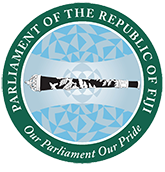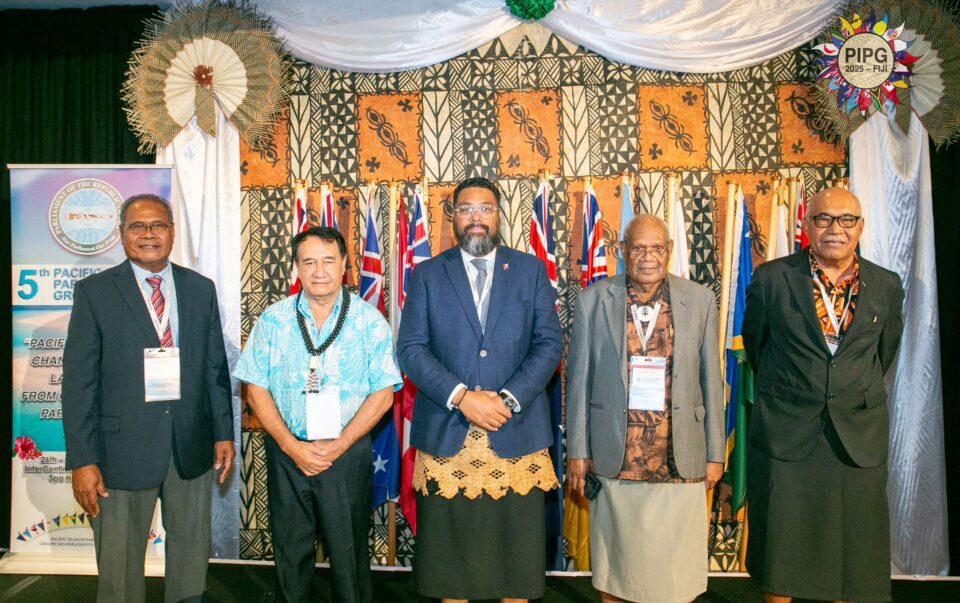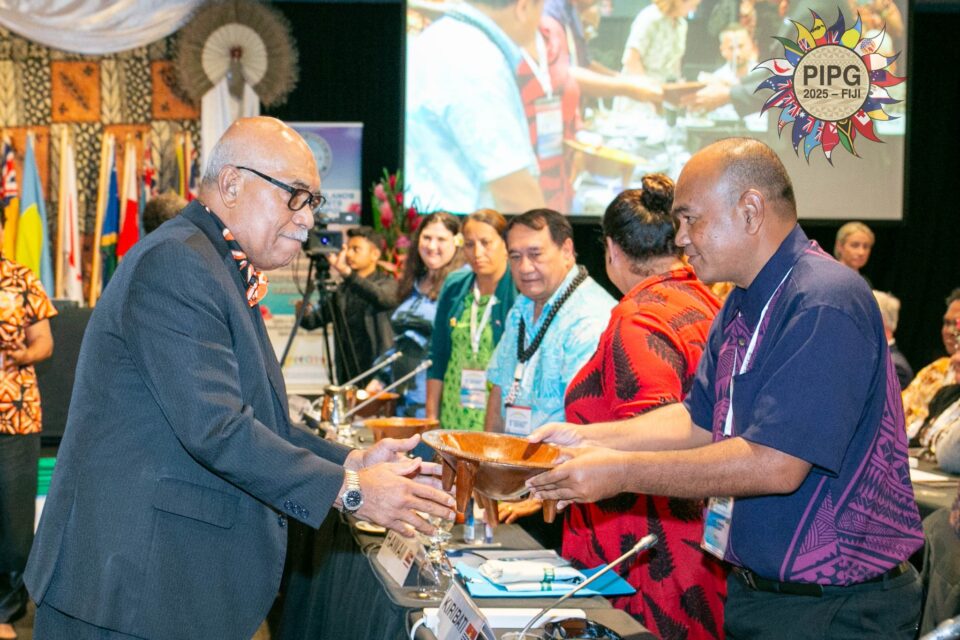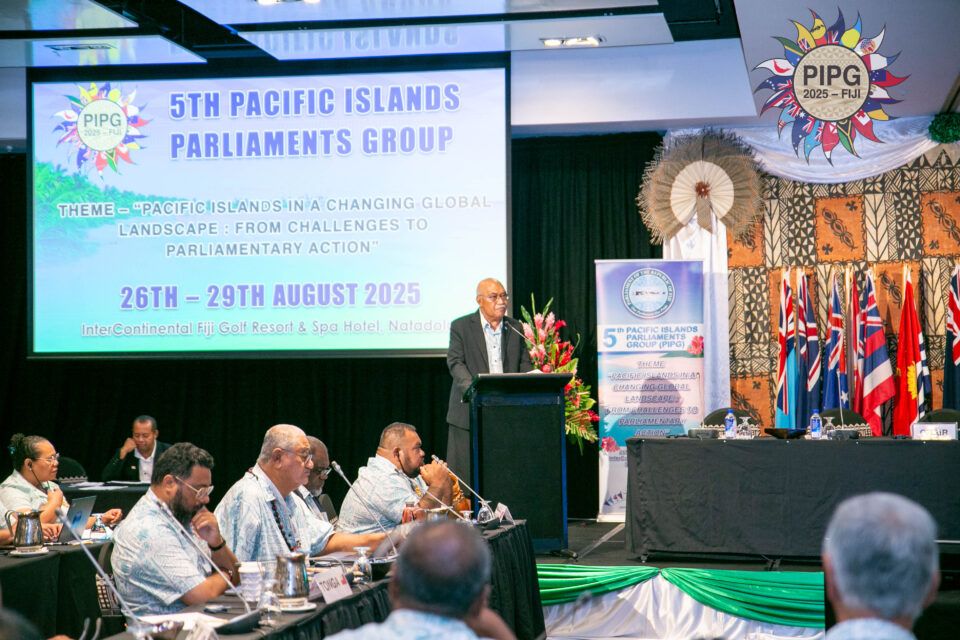Address at the Opening of Parliament 2017-2018 by H.E. the President
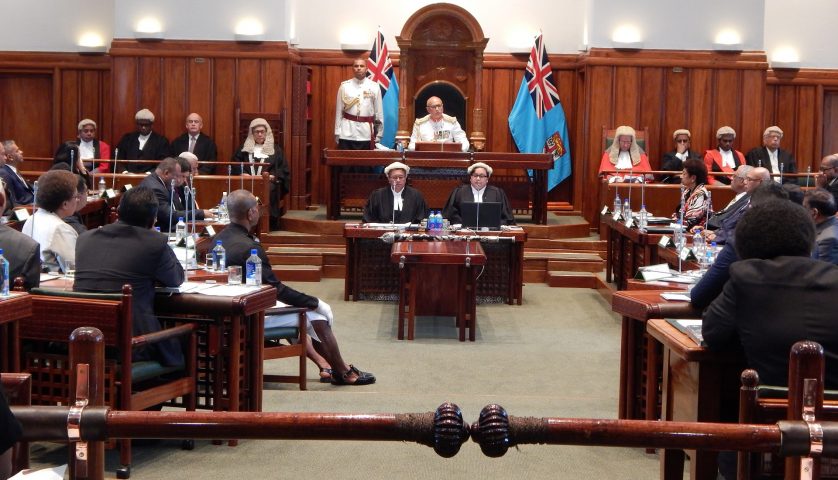
HIS EXCELLENCY MAJOR-GENERAL (Ret’d) JIOJI KONUSI KONROTE
CF, OF(Mil), MC, SBSt.J, MSD, OMRI, NOC
President of the Republic of Fiji
ADDRESS AT THE OPENING OF PARLIAMENT 2017-2018
Monday 4 September 2017 – 1000HRS
- The Honourable Speaker;
- The Honourable Chief Justice and Honourable Members of the Judiciary;
- The Honourable Prime Minister;
- Honourable Cabinet Ministers;
- The Honourable Leader of the Opposition;
- Honourable Members of Parliament;
- Your Excellencies, High Commissioners, Ambassadors and Members of the Diplomatic Corps;
- Distinguished Guests;
- Ladies and Gentlemen.
Ni sa Bula Vinaka, Namaste, Asalaam Alaykum, Ni Hao, Noa’ia ‘e Mauri, and a very good morning to you all.
It is my honour to open this new Session of Parliament as we anticipate Constitution Day, which is coming in just three days’ time.
We are assembled here today thanks to our Constitution, which is the supreme law of the land.
Our Constitution has been acclaimed internationally. It, amongst other things, mandates equality between all Fijians and a common identity. It has a comprehensive Bill of Rights, which affords all Fijians civil, political and socio-economic rights. More importantly, the Constitution does not just suggest action or simply express ideals. It directs Government to take action to turn those ideals into policies, laws and — most importantly — practices. Its language is clear: It uses words like “shall” and “must.” There is no ambiguity.
It is sad that in this world, there are many constitutions that express noble ideals, yet many of those constitutions lay collecting dust while the ideals they contain are ignored and many of these constitutions are not able to accommodate the contemporary changes in society, while comprehensively addressing the past.
I am proud to say that is not the case in Fiji.
The Constitution gives us a way to live together, to govern and to make decisions. In other words, it expects us to make informed decisions and settle disputes in a respectful way. In some parts of the world, civilised disagreement is a luxury, and political differences are played out in street violence and civil wars.
Madam Speaker, the Honourable Chief Justice, the Honourable Prime Minister, Honourable Cabinet Ministers, the Honourable Leader of the Opposition, Honourable Members of Parliament, Excellencies, Ladies and Gentlemen:
This is the last time in this term of Government, will I address you to open a session of Parliament.
Our Constitution specifies the term of Parliament as a minimum of three-and-a-half years and a maximum of four. Accordingly, we know that elections will be held sometime between April and November of next year. This will be our second election under the Constitution. It will be the first time that a government elected under our Constitution will go to the people to defend its record, and opposition parties will try to convince the people that they can do better. This is an element of our democracy.
We Fijians will be tested in this election. We will be and should be challenged to contest this election on the basis of policies and principles — and truth. Although it may be tempting in the heat of an election, we will be tested not to descend into demagoguery, race-baiting, ethnic profiling, diminished dignity and lies. This I urge you most earnestly: This election must be contested over policies, over the future, not ethnicity, religion or geography.
Elections are an integral element of democratic governance, but it is a sad truth that the elections are used to extenuate political differences. Each party will try to distinguish itself from the others. But after the election, we must come together to govern.
Yes, there will be winners and losers in Parliamentary votes as well, but only after debate and informal consultation. It would appear some politicians find it easier to talk to each other in Parliament than on the campaign trail.
Our 2014 elections were well-run and eminently credible by international standards.
Our Electoral Commission is busy preparing for the upcoming elections, and the leadership and staff there have done an excellent job establishing the technical framework under which these elections will be contested. Long live Fijian democracy.
Indeed the manner in which the Fijian Elections Office and its supervisor of elections have conducted themselves, have won them international acclaim and recognition.
Only a few days ago Fiji was elected to the Executive Board of the Association of World Election Bodies representing the Oceania Region. The Association of World Election Bodies comprises of 106 election Management bodies globally and this is the first time an Oceania seat has been included.
This is proof that our electoral system, our electoral processes and the calibre of our personnel at the Fiji Elections Office have integrity and credibility, which are compliant with international standards and norms.
Madam Speaker, the Honourable Chief Justice, the Honourable Prime Minister, Honourable Cabinet Ministers, the Honourable Leader of the Opposition, Honourable Members of Parliament, Excellencies, Ladies and Gentlemen:
It is also my duty today – as Head of State – to outline my Government’s legislative programme for the coming session. In this Parliamentary session, new laws will be introduced – and existing laws reviewed.
Government has an ambitious legislative agenda. It will place a large number of bills before Parliament that will require serious consideration and careful study. Most of these bills are intended to continue to modernise the economy, create increased economic opportunity and encourage economic development. Many of these will bring Fiji’s laws into compliance with international standards and best practices.
There will be a number of legal reforms, commercial reforms, and reforms to spur and improve development and encourage business and provide commercial and financial opportunities for all Fijians. The agenda includes legislation governing traditional knowledge and culture, patents, industrial designs and trademarks. Parliament will deal with changes in public health protection and quarantine. The financial reforms will cover credit unions, consumer credit, bankruptcy, tariffs and duties, and financial management. We will deal with substance abuse and anti-doping. And we will have legislation to reform town planning, land tenancy and subdivision of land. There will be administrative reforms affecting the public enterprises, Fiji Institute of Accountants, and registration of practising engineers.
Parliament will review the Financial Management Act, the Consumer Credit Act, the Security Industry Act, the Stamp Duties Act, the Customs Act, the Customs Tariff Act, the Land Transport Act, the Sale of Goods Act, the Bankruptcy Act and the Police Act.
My Government’s purpose is to continue to bring Fiji into the full mainstream of international best practises, to ensure that our legislation encourages — and certainly does not inhibit — proper development and growth, and to provide a positive climate for business to grow and for individual Fijians to accumulate wealth.
Madam Speaker, the Honourable Chief Justice, the Honourable Prime Minister, Honourable Cabinet Ministers, the Honourable Leader of the Opposition, Honourable Members of Parliament, Excellencies, Ladies and Gentlemen:
As we look forward to the legislation that you will consider in this Session of Parliament, it is also valuable to review what we have done — what you have done — for the Fijian people since the Constitution was adopted. We are here for one reason: to represent the Fijian people and to keep their interests always before us.
I am proud that we have now enjoyed eight consecutive years of economic growth, continuing the longest period of growth in Fiji’s history. This is due to prudent economic management and sound macroeconomic policies.
Our reputation among development partners and international financial institutions has never been stronger. These institutions like to lend their support to countries with sound policies and systems in place, countries that are stable and responsible. We give them that assurance, and they are responding with assistance, partnership and financing.
This economic growth has not been to the benefit of only a few Fijians. The latest statistics show that Fiji is only one of the five countries in the Asia Pacific Region, where inequality has in fact decreased.
The latest unemployment figures show that it has been the lowest in the past 15 years. A further testimony of our sound economic policies and planning.
I am also proud that our economic expansion has been broad-based. Education, health and welfare benefits have been extended as never before.
Government benefits have literally put more money in the hands of the lowest-income Fijians by reducing the number of things they once had to pay for.
Public education is now truly free. And I ask myself, why did it take so long?
Medicines under the Free Medicine Programme are free to Fijians with low incomes.
Raising the income-tax exemption to the first 30 thousand dollars and, the consequent overall taxation reduction has also given Fijians more spending power and been a stimulus to the economy.
The economy is expanding in part because my Government has established sound policies and trusted the Fijian people to respond with energy and sound ideas — and they have done just that, from the largest corporations to the smallest micro enterprise.
We are encouraging entrepreneurship at all levels in Fiji through the Small and Micro Business Grants, which is truly an investment in our people. It goes to show that when government has faith in the people, the people repay that faith. And when the people invest in their country, foreigners are never far behind.
A country has no greater asset for its future than its youth, and my Government has put a priority on giving every Fijian child and adult the opportunity for a solid education, one that will help each one become a responsible and productive citizen with the means to lead a happy and fulfilling life.
We do that in many ways: By improving teacher pay as we raise teaching standards. By providing free transport, because a student who cannot get to school cannot learn. By providing more tertiary scholarships and the loan scheme with greater flexibility and increased allowances. By developing a national system of technical colleges to build our capacity in the skilled trades, technology and paraprofessional fields. We also do not want our youth to be only job seekers but to be job creators. Accordingly, Government has increased the Young Entrepreneur Scheme or YES, which offers up to a maximum grant of $20,000 to innovative and creative Fijians between the ages of 18 to 30 years. By encouraging commercial farming by issuing 99-year commercial lease and start-up grants to young people through the Commercial Agricultural Scholarship Programme. Our children and youth are our most precious commodity. They are our future. How can we do less?
I am especially proud of the stand my Government has taken to protect the most vulnerable among us and to bring them into the mainstream. It is not enough to assist the elderly, the sick and the disabled. We must end their isolation from society and give them a place at the table.
My Government has a permanent and binding commitment to gender equality. We are promoting gender equality through changes in the law and through a never-ending battle to end sexual and domestic violence and punish anyone who preys on women, children and the weak.
Madam Speaker, the Honourable Chief Justice, the Honourable Prime Minister, Honourable Cabinet Ministers, the Honourable Leader of the Opposition, Honourable Members of Parliament, Excellencies, Ladies and Gentlemen,
A year ago, we were still basking in the Olympic glory of our victorious men’s Fiji Sevens team. It was a moment of unity like I had never before seen in Fiji —except perhaps during one of the worst moments in our history.
That was when Tropical Cyclone Winston attacked us with the strongest winds ever recorded in this part of the world. Winston brought Fijians together in adversity as neighbour helped neighbour and all differences were washed away with the storm.
Then the Olympics brought us together in joy when we were all transfixed, nervously watching events in far-away Brazil. Again, the differences were washed away, but this time for the love of our Fiji. This year, Winston is a strong memory as we have worked to rebuild.
Rebuilding will take time because Government is building back stronger, and I think this is wise. We need to rebuild schools and infrastructure that can withstand severe storms. We cannot send our children to schools that we know will not protect them.
The easy approach would be to build back quickly, just get buildings back up as fast as we could. But it would be unwise for Government to rush to another disaster. Better to maintain a steady pace to resilience and security. And I am pleased to see that we make more progress each week.
We have seen time and again that small island states and developing countries are not the only ones vulnerable to the severe storms that are surely influenced by global warming. The mighty city of Houston, with some 6 million people in its metropolitan area, has been paralysed by Hurricane Harvey and is facing years of recovery, even with the vast resources of the United States of America.
It is not only Fijian villagers who will be forced to move to higher ground away from the coast. It is not only the poor in India and Bangladesh who could be uprooted. They may be joined by wealthy Americans in Miami or Houston or even New York.
Madam Speaker, the Honourable Chief Justice, the Honourable Prime Minister, Honourable Cabinet Ministers, the Honourable Leader of the Opposition, Honourable Members of Parliament, Excellencies, Ladies and Gentlemen:
It is no cause for joy that others in the world share our risks. We view the misfortunes of others around the world with empathy and compassion. And we see that the climate emergencies prevalent around the world today are cause for cooperation.
That is why Fiji has taken on the presidency of the United Nations Conference on Climate Change, which will be held in Bonn, Germany, in November. Fiji is the first small island developing state to be given this honour and responsibility. And make no mistake about it, it is a serious undertaking. The nations of the world will meet in Bonn to advance the aims and ambitions of the Paris Agreement and further develop the implementation guidelines.
The Honourable Prime Minister is the president of what is known as COP23, aided by the Minister of Agriculture the Honourable Inia Seruiratu, who serves as High-Level Climate Champion, and Ambassador Nazhat Shameem Khan, who serves as Climate Negotiator. These demanding roles require an in-depth knowledge of the technical, political and economic issues in combatting climate change.
It will be Fiji’s job to lead 197 nations to a consensus that will substantially reduce global warming. Fiji did not come to this leadership role in a vacuum. We have always been an outward-looking people.
For us, the Pacific Ocean that surrounds us has never been a barrier; it has been a highway to other peoples and other lands.
We have long served our fellow human beings through our role as one of the most generous contributors to United Nations peacekeeping.
We recently chaired the Group of 77 – the Non-Aligned Nations — in the United Nations. Our Permanent Representative to the United Nations, Mr Peter Thomson, is President of the United Nations General Assembly. We are a leader in the South Pacific.
My Government has embraced this broader international role for Fiji, which brings prestige to our nation and allows us to give greater voice to the perspective and experiences of South Pacific nations and small island developing states. It is something that our people can be proud of.
Let there be no mistake about it. My Government is not in the presidency simply to arrive in Bonn and wield a gavel for two weeks. We take this responsibility most seriously — because the world demands it and because our future demands it. Climate change and ocean warming represent an existential threat to us and our neighbours, and we must fight it with all our strength.
There are those who say that our leaders should spend more time at home rather than attend these international gatherings. They say it distracts Government from the needs at home. But I say, What is more important than our existence? How can we not do all we can to combat the single greatest threat to Fiji’s future?
In this last session of Parliament before the next elections, I wish to thank the honourable members of Parliament for your service to the nation. I only remind you that as we move closer to elections, you may find yourselves pulled by opposing forces. One force is the spirit that most likely drove you to public service — the desire to serve your country and the people of Fiji. The other force will be political ambition, the desire to win.
I ask that you always do what is best for your country, that you think beyond ethnicity, religion, socio-economic status or any of the other insignificant differences that unscrupulous people use to divide us. If we respect each other, then everyone’s interests can be respected. Remember that our Constitution gives us the ability to debate with civility. And our Constitution provides that each of you be a representative of Fijians from all walks of life and from anywhere in Fiji.
Madam Speaker, the Honourable Chief Justice, the Honourable Prime Minister, Honourable Cabinet Ministers, the Honourable Leader of the Opposition, Honourable Members of Parliament, Excellencies, Ladies and Gentlemen:
Never before has the future looked so bright for Fiji. Yes, we have challenges, but we have all the tools in place to overcome them. So let us commit today to set a high standard for unity, and for democracy. Our people are watching. Our investors are watching, indeed, we are on the world stage, and the world is watching. All eyes are on Fiji.
It is now my honour to declare this new session of Parliament officially open.
May Almighty God Bless you all, and Bless our beloved Nation – Fiji.
Vinaka Vakalevu, Sukria, Bahoot Dhanyavaad, Xie Xie, Fai’aksea and Thank you.

